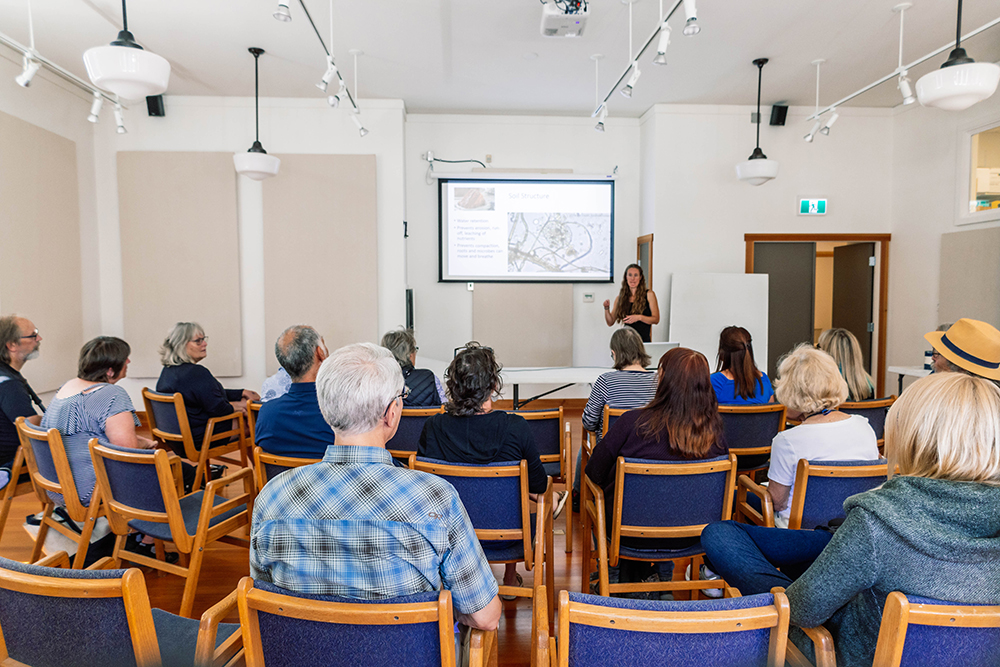WORKSHOPS & EVENTS

Wow. What can I say? You have expanded my brain I am sure. By a lot. What a great offering that was Amy. The combination of clearly articulated scientific understanding with a genuine love of and passion for soil wellness and how to live better on the land was just inspiring. I am so grateful for what I have learned and have already begun to dive a bit deeper.
– Karla Ryan
 Ever wondered about the foundation of living soil – those unseen critters beneath your feet? Plants rely on soil food web organisms for nutrients, pest and disease protection, communication, and even flood and drought resiliency. Come join Amy from Spring Hill Soil Lab as we take a family-friendly look at “who” these critters are and the role they play in healthy, resilient ecosystems (including your garden!). See what they look like under the microscope and discover how you can bring these microbes into your compost systems to help restore life to our degraded soils and to grow healthier, more nutrient-dense food.
Ever wondered about the foundation of living soil – those unseen critters beneath your feet? Plants rely on soil food web organisms for nutrients, pest and disease protection, communication, and even flood and drought resiliency. Come join Amy from Spring Hill Soil Lab as we take a family-friendly look at “who” these critters are and the role they play in healthy, resilient ecosystems (including your garden!). See what they look like under the microscope and discover how you can bring these microbes into your compost systems to help restore life to our degraded soils and to grow healthier, more nutrient-dense food.
Registration not required as this is a FREE WORKSHOP at DUNCAN SEEDY SUNDAY
March 23, 2025
12:00-12:45pm
 Participants will learn what the soil food web is, why it is important, and gain an understanding of the different types of biology, what they do and how to recognize them.
Participants will learn what the soil food web is, why it is important, and gain an understanding of the different types of biology, what they do and how to recognize them.
We will also learn about thermophillic composting and the Johnson-Su method, and practical tips for home composting. Participants are invited to bring in soil and compost samples to see what is currently living in their soil on the big screen.
Thursdays 7:00pm‐8:30pm
March 27 – April 10 | 3/$85
Code: 86635
Instructor: Amy Luck‐MacGregor
Cowichan Community Centre
To register please call Cowichan Community Centre at 250.748.7529
 These sessions are for people who have completed Introduction to Soil Biology Part 1.
These sessions are for people who have completed Introduction to Soil Biology Part 1.
We will build on knowledge gained so far and teach you how to turn your microbially diverse composts into liquid extracts and teas to restore soil biology both above and below ground. We will cover a variety of extraction, storage and application methods.
Thursdays 7:00pm‐8:30pm
April 17-24 | 2/$56
Code: 86636
Instructor: Amy Luck‐MacGregor
Cowichan Community Centre
To register please call Cowichan Community Centre at 250.748.7529
 Key to any soil regeneration effort is knowing where your soil is currently at. Are all of the beneficial groups of organisms home in your soil? Are there organisms present that could hinder plant growth? Is there a good level of diversity? Are the numbers adequate for the plant you want to grow?
Key to any soil regeneration effort is knowing where your soil is currently at. Are all of the beneficial groups of organisms home in your soil? Are there organisms present that could hinder plant growth? Is there a good level of diversity? Are the numbers adequate for the plant you want to grow?